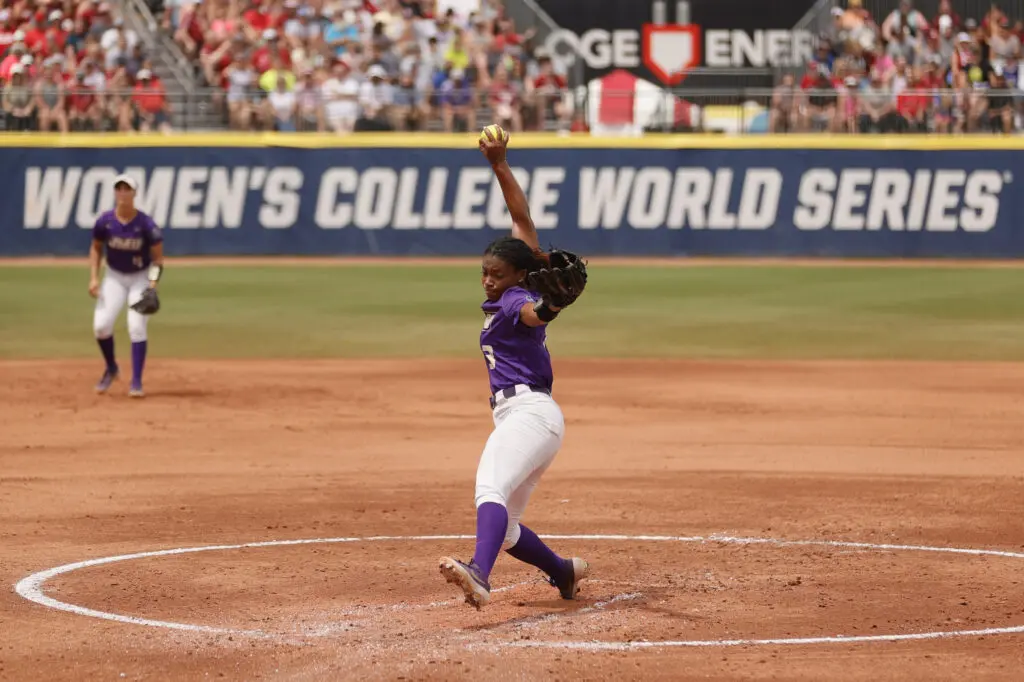During the 2021 Women’s College World Series, Odicci Alexander (pronounced “odyssey”) exploded onto the national stage when she led unranked James Madison University to the semifinals. The Dukes upset top-seeded Oklahoma in Game 1 before the eventual champion Sooners brought their Cinderella run to an end.
In that remarkable postseason campaign that capped her college career, Alexander threw 94 strikeouts in 76 2/3 innings and finished with an 8-3 record, earning wins over four top-10 teams and a spot on the WCWS All-Tournament team. She pitched every single inning for her team at the WCWS until the fifth inning of their final game. She was named D1 Softball’s Woman of the Year and Softball America NCAA Pitcher of the Year, and she was nominated for the Best Female College Athlete ESPY Award.
The performance was as impressive as the list of stats and awards suggests, but the significant part of Alexander’s story is what she helped reveal about the market that exists for women’s sports and its athletes.
In 2021, the WCWS averaged 1.2 million viewers and outperformed the men’s tournament by 60 percent. Each time Alexander took the mound in the Oklahoma City heat that June, she gained thousands of new followers on social media. People couldn’t get enough of her. As one of a small group of Black players in the sport, especially on the mound, the timing of her success on the big stage was powerful — the summer after George Floyd’s murder at the hands of police ignited a movement of racial reckoning in the U.S.
“I always felt like I was the only Black girl around most of the time at tournaments,” she recalled on Sweat the Details about her experience growing up in the sport. “It really opened my eyes at the World Series when I was the only Black girl pitching on that platform.”
But it was more than the color of Alexander’s skin or the black and white numbers on the scoresheet that drew fans in. It was her poise, her passion and her heart of the ultimate underdog — all of which were distilled into one of the most spectacular plays ever seen at home plate, when she charged a bunt, scooped it mid-stride and laid out into the air, tagging the base runner out by inches to maintain the Dukes’ 2-1 lead over Oklahoma State and earn her team a spot in the semifinals.
I will NEVER forget calling this game on ESPN with a genuine reaction of, “this is one of the greatest plays I’ve ever seen here.”
— Amanda Scarborough (@ascarborough) June 4, 2022
I know me and @kevinnbrown will remember getting to call @2seas__ /JMU’s games forever. https://t.co/Z6WpOVgGYS
Alexander’s superhuman feats on the diamond are balanced by a down-to-earth humility off of it.
“You can be the best athlete, but being a good person makes you an even better athlete. People overlook that part of sports,” she told Sports Illustrated earlier this year. “At the end of the day, in any sport you play, it doesn’t define who you are as a person. I try to instill that in these younger girls: Be true to you, be who you are, be the best person.”
The NCAA’s new NIL legislation allowing student-athletes to profit off of their name, image and likeness while in college didn’t go into effect until several weeks after Alexander threw her last pitch. However, as soon as Alexander walked off that field on June 7 to a standing ovation from a crowd of 12,000-plus, most of whom were Sooners fans, her college career officially ended, and she could sign any deals she pleased.
One year ago today JMU's amazing run ended in the WCWS.
— JMU Sports News (@JMUSportsNews) June 7, 2022
Odicci Alexander's otherworldly performance will go down as one of the best individual performances in JMU athletics history. A standing O is still deserved a year later 👏pic.twitter.com/oLNlW72OLG
Within days of arriving back to campus in her home state of Virginia, Alexander began capitalizing on the massive following her performance generated. She hired a manager, signed a contract with the USSSA Pride pro softball team and released her own apparel merchandise. Over the summer, she picked up several endorsements, the most notable when she signed on as an Under Armour athlete that August. Today, she has tens of thousands of followers on Twitter and TikTok and nearly 100,000 on Instagram, and she takes her newfound influence to heart.
“I now have a voice and I’ve impacted and inspired so many girls that look like me or who don’t look like me, or who play the same sport as me,” Alexander told Sports Illustrated. “While I’m on this huge platform, my motivation is to continue to grow the game in a positive way.”
When Title IX was passed in 1972, exactly 50 years ago this month, the underlying goal was equal opportunity. Decades later, the fruits of that groundbreaking legislation are personified in athletes like Alexander, whose scholarship would not have existed without it. But the long-term result of Title IX is blossoming into much more than equal access. The immense popularity of Alexander and her historic WCWS run demonstrate that, 50 years later, the consumer interest and marketability of women’s sports and their athletes are just beginning to unlock.
“For 20 years and more we have been trying to guilt people into watching women’s sports. But everyone in this space has to understand that sports run on hype, not guilt,” says Haley Rosen, Just Women’s Sports Founder and CEO. “To get where we want to go, we’ve got to talk about women’s sports like the 200-billion-dollar industry it’s projected to become in the next decade.
“We have to remember that sports are entertainment and lean into everything we love about them. … Women’s sports should feel exciting, dramatic, fun. When we do this, when we focus on the sports, it works.”
Since 2003, NCAA softball revenue has increased by 339.6 percent, according to Department of Education data. It’s one of the fastest-growing sports in the NCAA, yet there are still minimal opportunities for softball’s best athletes to earn a decent living playing professionally.
The summer Alexander graduated, National Pro Fastpitch (NPF) — which had been the main professional softball league in the U.S. since its inception in 2004, albeit with dismal salaries — announced it was suspending operations. In its place, new opportunities sprouted.
Athletes Unlimited burst onto the scene in 2020 with a fantasy-style model, where the top four players from each week become captains and draft new teams, and the player with the most individual points at the end of the five-week season is crowned as champion. This year, they added a condensed two-week version that strategically followed right on the heels of the WCWS.
Another traditional style league, Women’s Professional Fastpitch (WPF), is also kicking off this summer made up of the USSSA Pride and a brand-new pro team, the Smash It Sports Vipers of Rochester, N.Y. Although they are starting with a condensed, exhibition-style schedule, WPF’s goal is to grow into a sustainable pro league.
After playing in Athletes Unlimited’s second season in 2021, Alexander opted to take her skills abroad this summer to Japan’s Diamond League as a member of Toda Medics.
Playing in Japan, the USA’s biggest global rival in the sport and where women’s softball has been a mainstay pro sport for many decades, is a common trend for top players from the U.S. and an experience Alexander eagerly sought out. Whether her Diamond League commitment will permit her to return stateside to re-join USSSA Pride or step into the circle for Athletes Unlimited later this season remains to be seen. As one of the biggest names in the game, she’d be a highly sought-after addition for both leagues.
Jocelyn Alo, Alexander’s friend and WCWS rival, recently announced she’s joining the WPF for her first professional foray, giving the new league a huge boost. The two-time USA Softball Collegiate Player of the Year signed with the Vipers shortly after leading Oklahoma to its second consecutive WCWS Championship earlier this month.
An emotional postgame interview from your 2022 #WCWS MVP ❤️
— ESPN (@espn) June 10, 2022
“Anything is possible if you work hard. … Thank you for following me. Jocelyn Alo signing out.”@78jocelyn_alo | @OU_Softball pic.twitter.com/geWz2O8y4Q
Watching Alo leave the field to her own standing ovation and emotional farewell interview with ESPN’s Holly Rowe a year after Alexander’s similar exit from the college scene serves as a reminder of the limited options for world-class softball athletes beyond the NCAA. But the public frenzy and massive followings that both Alo and Alexander have garnered also bolster the vision of how rich the future could be for pro softball in the U.S.
The mantra, “If you build it, they will come,” has been touted by many in the women’s sports industry, as viewership records are repeatedly broken and athletes like Alexander garner unprecedented fame and attention.
The first 50 years of Title IX were spent “building,” and in many arenas the mantra needs to be updated. What athletes like Alexander have revealed is, “If you promote it and put it on TV, they will come. They will come in droves.”
Tessa Nichols is a contributing writer at Just Women’s Sports.

